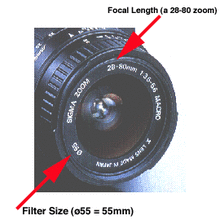Filters are often overlooked when considering equipment for your camera and even worse unnecessary filters are promoted. For instance, the UV filter is not necessary and is a filter with the ability that if you use certain editing or angles can be mimicked easily. When considering different filters to use for your camera, we recommend buying a circular polarizer.
What a circular polarizer does is enhances color and contrast in your photos. This becomes extremely helpful in situations including reflections from different surfaces such as glass, windows, water, etc. The filter eliminates the reflection and gives you the photo you see with your eye. For example, when shooting fish in a pond, the circular polarizer removes the reflection that commonly comes from the movement of the water. Light rays reflecting from these surfaces can come polarized and the circular polarizer filter has the ability to select which light rays enter your camera lens and show in your photos. Also, when we go to edit our photos there is the regularly used contrast button, but with the circular polarizer it gives the colors the capability to become more saturated and appear clear with better contrast. This is helpful when you are in a setting with similar colors close together causing the different textures or shapes of these colors become blended and not truly pop like they should. This is most often prominent in pictures with light blue skies and white clouds. However, with the circular polarizer there is a definite contrast between the light colored clouds and the clear blue sky. While promoting even and honest saturation and contrast in photos, the polarizing filter does not affect the true color balance in the shot.
When choosing a brand for the circular polarized filter, you can easily go with your correlating camera’s brand, but for a better value and with equal or better durability, we recommend the Hoya brand filters. Tiffen comes up with a cheaper price, but also are not made well compared to Hoya, Canon, and Nikon.
In general, filters are very delicate and thin, but a nice feature of the Hoya brand is that they are built with layers to build strength. They are also dust repellant and do not pick up fingerprints (unless purposely trying to smug the lens). An important aspect of a filter to pay attention to the thickness of the glass. Typically, the thinner the lens the better and Hoya circular polarized filters are equipped with a low profile frame, which includes a super thin filter frame. Also, important is the tint of the frame. The tint of the frame allows you to have a longer exposure and collect all of the colors and details of the frame.
 The Hoya circular polarized filter come in different sizes that coordinate with your camera lens, so it is important to make sure the filter fits. The sizes start at 52mm, 55mm, 58mm, 62mm, 67mm, 72mm, 77mm, and 82mm. The most common size for cameras is the 72mm and that is the size our link leads you to. To find the size of your lens, you must first choose the lens you use most often and want the filter for. (If you have multiple lenses the same size the filter can be used on all of them). Then you will look at the inside rim of the lens and it will have the brand name, the focal length (ex. 28-80mm), and it will have a number next to a circle with a line through it. This number will be your filter size and will be the size filter you will need to get.
The Hoya circular polarized filter come in different sizes that coordinate with your camera lens, so it is important to make sure the filter fits. The sizes start at 52mm, 55mm, 58mm, 62mm, 67mm, 72mm, 77mm, and 82mm. The most common size for cameras is the 72mm and that is the size our link leads you to. To find the size of your lens, you must first choose the lens you use most often and want the filter for. (If you have multiple lenses the same size the filter can be used on all of them). Then you will look at the inside rim of the lens and it will have the brand name, the focal length (ex. 28-80mm), and it will have a number next to a circle with a line through it. This number will be your filter size and will be the size filter you will need to get.
So, when looking for small piece of equipment that is not going to break the bank and will substantially increase the depth and beauty of your photos, a circular polarized filter!
